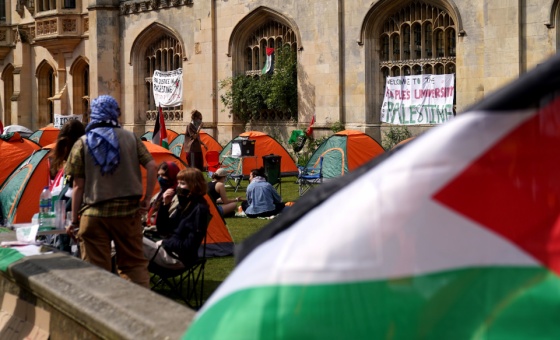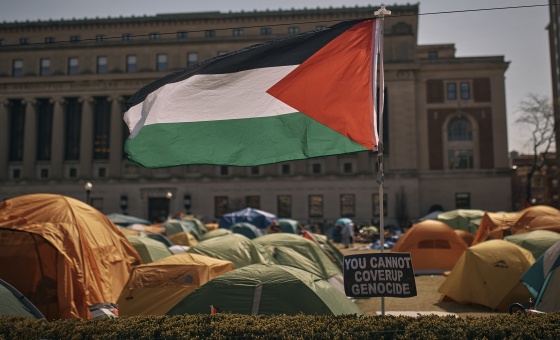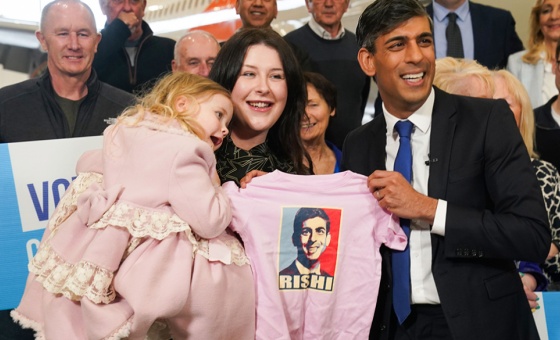This is the last article you can read this month
You can read more article this month
You can read more articles this month
Sorry your limit is up for this month
Reset on:
Please help support the Morning Star by subscribing here
Immigration has once again become a central political issue. It has done so periodically dating back to Enoch Powell’s “rivers of blood” speech, Oswald Mosley’s blackshirts and beyond.
It is often used by the right to scapegoat foreigners and ethnic minorities, and to create division among workers.
The late great Stuart Hall examined this in his famous study Policing The Crisis. The Caribbean community was scapegoated by labelling young black men as potential “muggers” in order to justify increasing police numbers on the street.
At the end of last year there was a typically exaggerated reaction to the news that net migration had reached 182,000 during 2013, which actually amounts to a population increase of less than 0.3 per cent.
But what didn’t capture the headlines in such a high-profile way was the findings of the recent ChildLine study which showed a 69 per cent increase in racist bullying of children over the last two years.
The impact of anti-immigration hysteria on ethnic minorities seems to matter little to the electoral strategists of Ukip and the Conservatives.
While there is good reason to criticise the vast levels of migration taking place on a global scale, most of the right’s complaints are ill-founded, illogical and often simply wrong.
They claim that the increase in immigration leads to more crime, but crime levels have fallen consistently over the last 20 years that have seen immigration overtake emigration.
They “blame” immigration on the EU and the new accession states, but official 2012 figures show that most that come to Britain arrive from China and India.
They argue that Britain is “full up,” but this country consistently has an estimated 700,000 homes sitting empty at any given time, according to the charity behind emptyhomes.com.
It is also continually asserted that immigrants are putting a strain on public services such as GPs, hospitals and schools.
But isn’t this an argument for more of those Indian doctors, more of those Filipino nurses and those South African teachers? (Surely the right couldn’t care less that such professionals are better needed in the slums of India or the townships of South Africa.)
One of the most pernicious arguments is that immigrants are simply “welfare tourists.”
This myth plays on the concerns about the dependency ratio in Britain.
It is true that for the first time Britain now has more dependants than non-dependants, which is primarily due to the growing number of pensioners.
And so pensions have become the single-largest area of public spending — not welfare benefits as the government disingenuously claims.
However, immigrant communities have a very different dependency ratio. They have far more economically active non-dependants, earning money and paying taxes.
They have far fewer dependants, not least because it’s very rare for people to migrate in old age — instead they’re overwhelmingly economic migrants coming to Britain to work.
However, what the right fails to condemn is the real tragedy of immigration. As capitalism has globalised, migrant workers have become the new reserve army of labour.
Labour-intensive operations, such as textiles for example, can be relocated to where the labour is cheap but the building sites of Dubai, the hotels of London and the farms of East Anglia cannot.
So when Lance Batchelor, the chief executive of Domino’s Pizza UK, recently complained about the problems that immigration controls were causing his company as a large employer, he didn’t do so because such corporations want to promote multiculturalism or to help workers escape the poverty of Asia, Africa or eastern Europe. He did so because he doesn’t want to be frustrated in his pursuit of cheap, flexible non-unionised labour.
As reported in the Star, TUC general secretary Frances O’Grady has stated that workers’ “biggest concern is the bosses who use cheap migrant labour to undercut people’s pay and pensions.” This is what so many on the left fail to see.
One of the worst examples of the exploitation of this migrant army of labour is the Qatar World Cup project.
Qatar is the richest country in the world in terms of per capita GDP — so to build its World Cup stadiums you might expect that it could afford to employ, house and pay its construction workers handsomely.
But such compassion has no place in the dynamics of the Gulf state’s feudal capitalism.
Instead, Qatar brings them in from overseas — mostly from Nepal — confiscates their passports, houses them in filthy conditions, often doesn’t pay them for months and pays scant regard to their health and safety.
During the summer of last year they were dying on the building sites at a rate of one a week in the searing heat.
The International Trade Union Confederation says 1,200 migrant workers from India and Nepal have died in Qatar since the country was awarded the 2022 World Cup. It estimates that 4,000 migrant workers will die by the time the first game is played.
This unspeakable horror is unfolding with the complicity of Fifa and the corporations that are looking ahead at the profits to be made from the bizarre decision to hold the World Cup in this autocratic little kingdom.
Bonded labour such as this is one of the worst examples of the tragedy of a world of migration that has developed as capitalism has globalised.
But in Britain migrant labour is also blatantly being exploited — it’s being used as a part of the race to the bottom.
Retail outlets, hotels, cleaning agencies farms and others are all using migrant labour to achieve a casualised, low-paid, flexible and insecure workforce.
It is often argued that immigration has a positive impact on pay. But this is disingenuous.
Nickell and Saleheen’s 2008 study shows that “a 10 percentage-point rise in the proportion of immigrants working in semi/unskilled services — that is, in care homes, bars, shops, restaurants, cleaning, for example — leads to a 5.2 per cent reduction in pay.”
A similar study for the Centre for Research and Analysis of Migration at UCL by Dustman et al corroborates this, stating: “We find that immigration depresses wages below the 20th percentile of the wage distribution.”
The assertion that there is an “overall” positive impact on pay is factual only because the high salaries among many high-tech staff, those working in the financial sectors and other professionals, skew the total figure.
The free movement of labour policy of the EU superficially appears progressive and is seen as such by many on the left, but it is designed only to allow systematic exploitation of labour.
It’s another example of the post-modern myth of “freedom” and “choice.”
The European Court of Justice is also complicit in this with rulings such as the Laval, Viking, Ruffert and Luxembourg cases all defeating trade union moves to prevent migrant workers being used to displace unionised workforces.
One of the often ignored problems with mass migration is the displacement and disruption that its victims suffer.
Many migrant workers are dislocated from their families and communities, they are demonised in the host countries, often do the very worst jobs and then send their earnings home to support young dependants they’ve had to leave behind. Kerala in southern India has one of the highest levels of absent fathers in world.
Thanks to the communists who have periodically administrated the region, Kerala has strict employment and wage protection laws.
But this deters investment by the transnational corporations forcing many men to migrate for work who then send their wages home for their dependants.
There are almost 200 million migrant workers spread across the globe sending an estimated £300 billion in remittances to families in their countries of origin.
Very many migrant workers are often overqualified for the work they do and so there is also, in effect, a brain drain from the countries of origin.
The investment that these developing countries make in terms of parenting, healthcare, education and training is often squandered as they then see their young talent move abroad for work.
One of the worst examples of this is in the battle in east Africa against the disfiguring disease noma.
There’s a desperate need for plastic surgeons to rebuild the faces of the children hit by this little-reported disease. However there are more Ethiopian plastic surgeons in Chicago than there are Ethiopian plastic surgeons in the whole of Ethiopia.
But the impact on the nations of origin is the last thing that the Conservatives or Ukip are concerned with.
Their strategy is to tap into anti-immigrant hostility as they join in an undignified battle to win the anti-immigrant vote.










